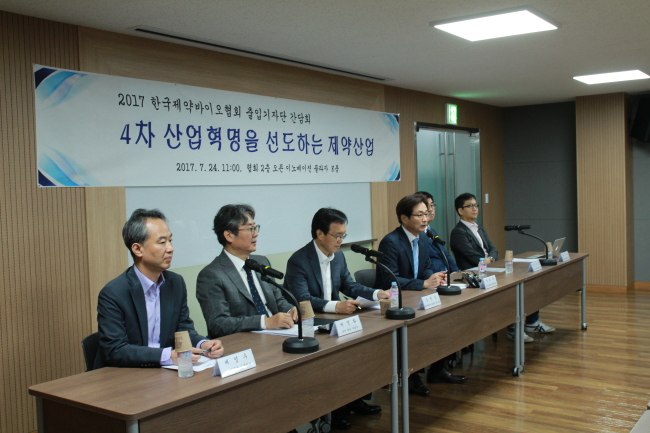South Korea’s leading biopharmaceutical association has set out to form a new center that will support the country’s new drug development efforts with artificial intelligence computing technologies.
The Korea Pharmaceutical and Bio-pharma Manufacturers Association said Monday that it is working to create an AI-backed drug development support center this year to expedite ongoing efforts by local drugmakers to develop new blockbuster therapies for diseases.
New drug development is a lengthy, high-risk and capital-intensive endeavor. According to the KPBMA, it takes an average of 10 years and around $2.4 billion in funding to develop a new drug.

Officials from the Korea Pharmaceutical and Bio-pharma Manufacturers Association discuss its agenda for Korea’s biopharma sector in a press conference held at the association’s headquarters in Seoul, Monday. (KPBMA)
The process begins by examining around 5,000 to 10,000 new drug candidate substances and narrowing it down to one substance to be further pursued. This early development stage is where artificial intelligence and big data can lend a big hand, said the association.
“Artificial intelligence can greatly aid researchers in determining the most promising drug candidate as well as setting up development procedures in a way that maximizes its success potential,” said Pae Young-wook, a board member of the KPBMA’s research & development committee.
Armed with the ability to process medical big data, artificial intelligence computing systems can predict the drug’s efficacy and side effects, which can be used to guide and optimize clinical trial planning. Such capabilities can greatly cut down the time typically needed for new drug development, according to Pae.
Using AI to guide new drug development is something that global big pharma companies are already doing. For example, Pfizer has adopted IBM’s AI software Watson for Drug Discovery to expedite its immuno-oncology research, while Israel-based Teva is using machine learning algorithms to support its drug repurposing efforts.
The KPBMA said it had begun working with around 20 local drugmakers as well as the government to create this new AI-backed drug development center. Its efforts are expected to go hand-in-hand with the medical big data initiative being pushed by the current administration, the association said.
The Moon Jae-in administration has pledged to create a “fourth industrial revolution” committee that would oversee the development of transformative future technologies including AI and medical biotechnology.
By Sohn Ji-young (
jys@heraldcorp.com)






![[Graphic News] More Koreans say they plan long-distance trips this year](http://res.heraldm.com/phpwas/restmb_idxmake.php?idx=645&simg=/content/image/2024/04/17/20240417050828_0.gif&u=)